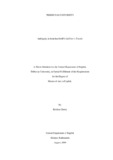Please use this identifier to cite or link to this item:
https://elibrary.tucl.edu.np/handle/123456789/3286Full metadata record
| DC Field | Value | Language |
|---|---|---|
| dc.contributor.author | Chetry, Krishna | |
| dc.date.accessioned | 2018-03-21T04:42:16Z | |
| dc.date.accessioned | 2021-07-23T04:34:46Z | - |
| dc.date.available | 2018-03-21T04:42:16Z | |
| dc.date.available | 2021-07-23T04:34:46Z | - |
| dc.date.issued | 2009-08 | |
| dc.identifier.uri | http://elibrary.tucl.edu.np/handle/123456789/3286 | - |
| dc.description.abstract | The ambivalence in Swift’s novel is attributable to his life experiences, which itself seems to be flowing in opposite directions. Gulliver's Travels is arguably the greatest satiric attempt to shame men out of their vices by constantly distinguishing between how man behaves and how he thinks about or justifies his behavior in a variety of situations. Lemuel Gulliver is a miscast between reality and fantasy. He is on the one hand a novice, an observer, on the other hand he is the teacher, the commentator. This theory delves into Gulliver's character, as a satirical device, and how it serves Swift's ends by being both a mouthpiece for some of Swift's ideals and criticisms. | en_US |
| dc.language.iso | en_US | en_US |
| dc.publisher | Central Department of English Kirtipur, Kathmandu | en_US |
| dc.subject | English literature | en_US |
| dc.subject | English Novel | en_US |
| dc.subject | Human Nature | en_US |
| dc.title | Ambiguity in Jonathan Swift’s Gulliver’s Travels | en_US |
| dc.type | Thesis | en_US |
| Appears in Collections: | English | |
Items in DSpace are protected by copyright, with all rights reserved, unless otherwise indicated.

